- Last Updated:
- 5/21/2025
- Khaleel Hayes
Pop quiz! Are you a disc jockey (DJ) who:
A. Blew out your speakers during a gig?
B. Accidentally dropped and broke them while moving them to your car?
C. Is brand new to the industry and unsure how to find the right speakers for your needs?
No matter the answer, we have your back! We spoke to real DJs and scrolled through all the specs so you don’t have to. Whether you’re MCing a wedding or dropping beats at the club, you need the right speakers to make every set on point. So make some noise for our eight best DJ speakers!
What to Look For
When shopping around for the right speakers, it’s easy to get overwhelmed by specs and reviews. To simplify the process, we narrowed it down to the most important things to consider when browsing for speakers:
- Sound quality: You want balanced speakers, where frequencies on both units boost the same sound levels. These speakers will cost more, but they’re worth the investment to ensure a high-caliber performance.
- Power: Power output depends on where your gigs are and the number of attendees. Generally speaking, you need five watts per person attending an indoor show and 10 watts per person for outdoor venues.
- Connectivity: The most common connectors you’ll encounter are XLR, TRS, and RCA. XLR and TRS connections will be better for you since XLR cables are better at transferring sound across greater distances without sacrificing quality, and TRS cables are more balanced.
- Size: If you travel for gigs, you need to consider the dimensions and weight of your speakers since you’ll have to lug them around between venues. Finding a balance between quality and transportability is key.
- Passive or active: Passive speakers require an external amplifier, while active speakers have a built-in amplifier. Active speakers tend to be pricier than passive speakers, but they reduce the gear you’ll have to carry around.
- Price point: Have a realistic budget. While it’s tempting to go after the cheapest speakers on the market — especially if you’re just starting out — remember that these speakers are a business investment.
Take it From the Pros
When choosing the right DJ speakers, you must consider how they will fit with your industry and gig setups. Professional wedding and party DJ Jon Jon gave us details on his brand of choice: JBL’s PRX815.
“For me, the PRX815 served the purpose of being easy to set up and loud enough for both my weddings and parties. If you’re only DJing weddings, you really just need speakers that will be loud enough for up to 200 or 250 people. For a crowd of up to 200 people, 12 to 15-inch speakers will normally do the trick.”
Size is also important, especially when packing your speakers and other equipment into your vehicle. DJ Druw of Gulf Coast Entertainment relies on brands like QSC, RCF, and Yorkville for the portability and reputation of providing great sound.
“These speaker brands make all types of speakers, tops and subs, as well as column speakers, which have been a trend in our industry over the last 10 years. I usually have to be able to fit the entire system, with lights and a dolly, in the back of my SUV. Also, whether it’s a traditional setup or a column system, you want it to look nice and presentable at parties.”
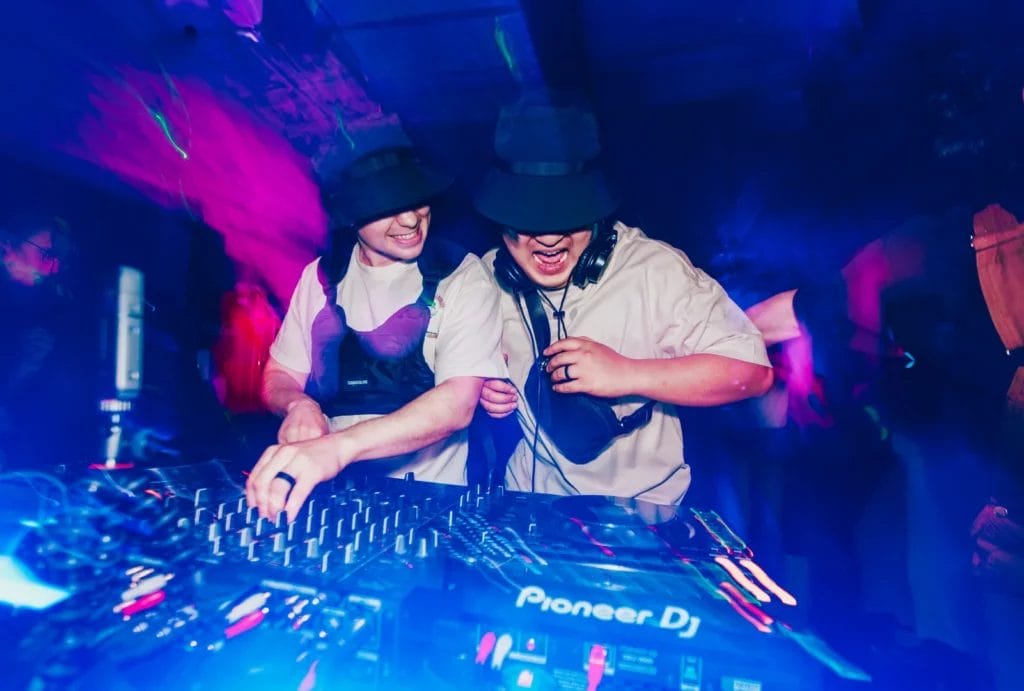
Product Guide: Best DJ Speakers
Your pro DJ speakers need the right balance of connectivity, power, Bluetooth capabilities, weight, and price while also meeting your needs and budget. That’s a lot to consider! To make your life a little easier, we’ve compiled a list of the eight best speakers on the market today.
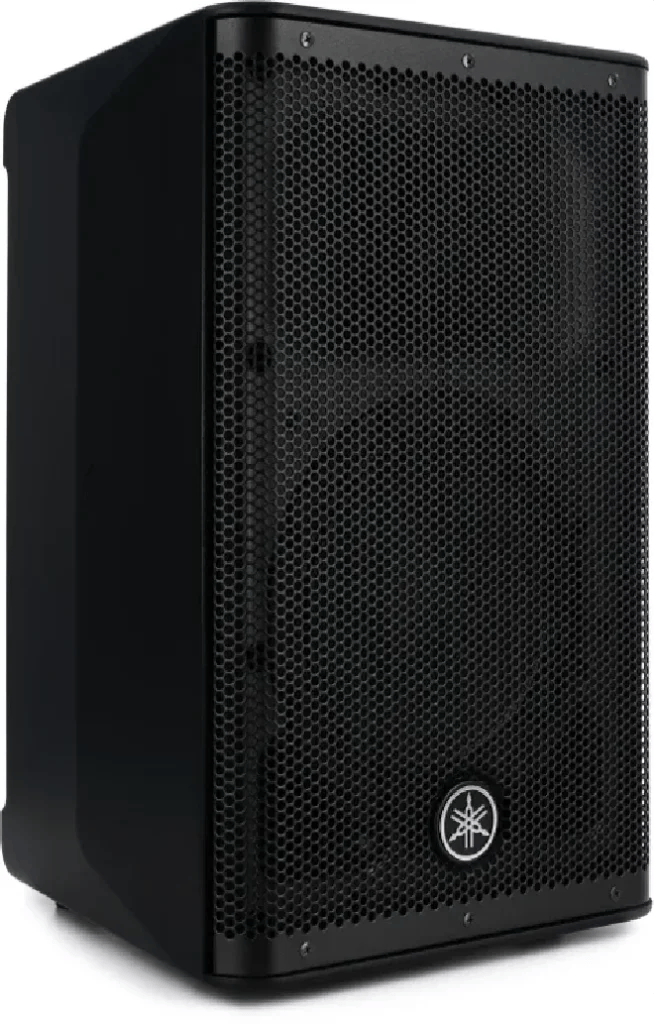
Yamaha DXR8MKII
Image Source
1. Yamaha DXR8MKII: Best for Small and Mid-Sized Indoor Events
- Price: $599.99 (single)
- Weight: 28.2 lbs
- Driver Size: 8 inches
- Output Power: 1100 watts
- Connectivity: Input: (1) XLR 1/4 combo (mic/line), (2) 1/4 (L/Mono, R), Dual RCA Stereo; Output: (1) XLR (link out) and (1) XLR (thru)
- Bluetooth: No
The Yamaha DXR8MKII is a versatile speaker that connects to different DJ equipment thanks to an array of connectivity options. You can plug in microphones or other audio sources into this speaker’s built-in three-channel mixer without needing a separate system. The DXR8MKII offers robust sound quality for any gig, making it well worth the price.
This speaker’s compact and lightweight design travels well, making it ideal for small conferences, acoustic performances, and intimate mobile DJ parties.
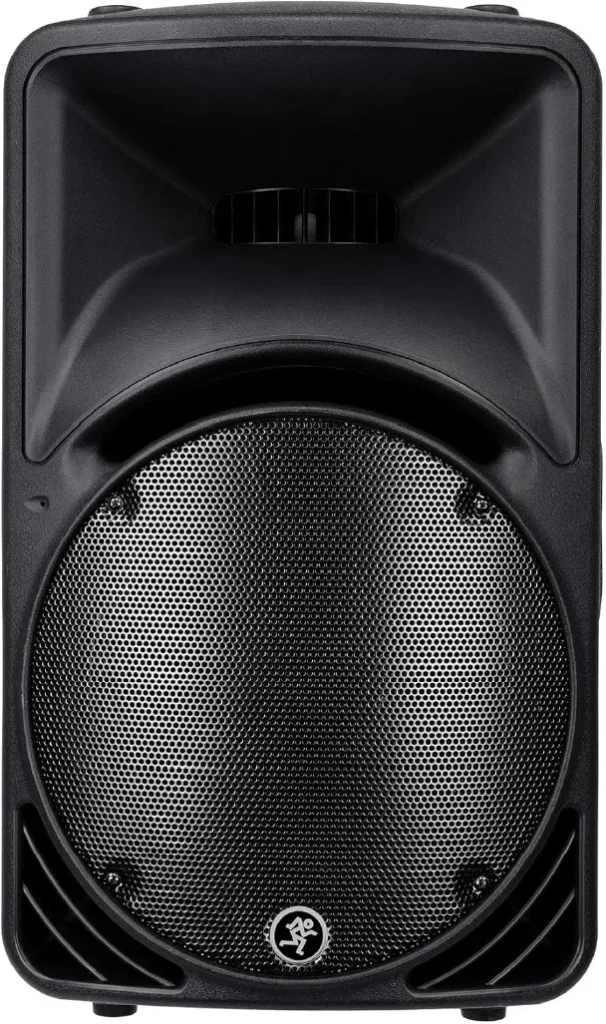
Mackie c300z
Image Source
2. Mackie c300z: Best for Small Clubs and House Parties
Price: $499.99 (single)
Weight: 20 lbs
Driver Size: 12 inches
Output Power: 600 watts
Connectivity: Input: (1) Speakon, (2) TS
Bluetooth: No
The Mackie C300z is durable and lightweight, making it perfect for mobile DJs. The titanium driver has superb equalization (EQ) options for great high-fidelity sound at any volume. This budget-friendly speaker also delivers a full-bodied bass, which is ideal for social events like small house parties and club spaces.
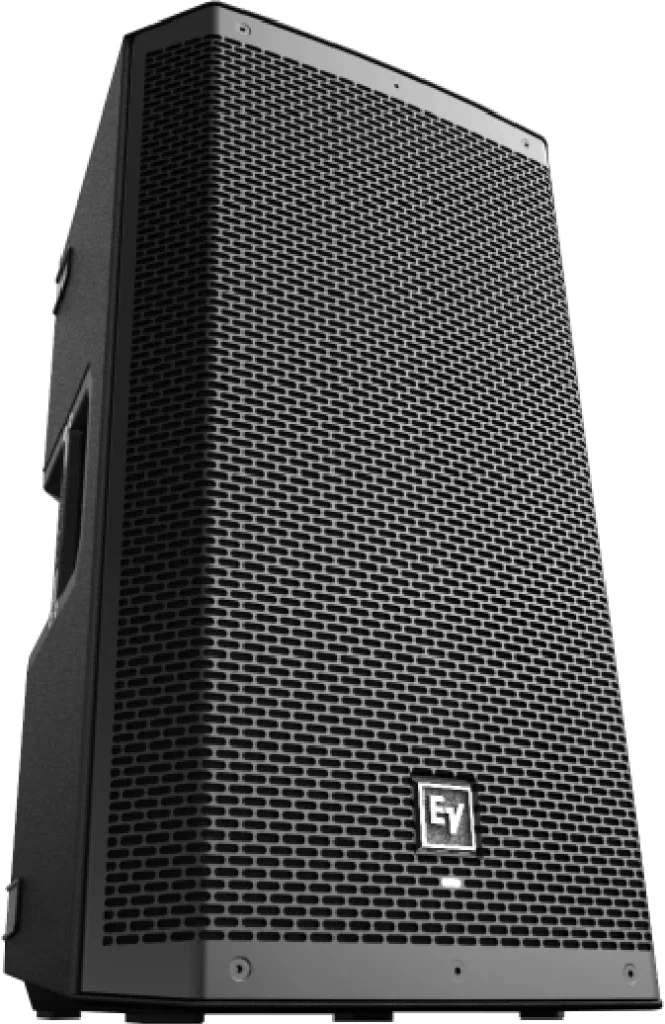
Electro-Voice ZLX-12BT
Image Source
3. Electro-Voice ZLX-12BT: Best for Mid-Sized Weddings and Corporate Events
Price: $549.99 (single)
Weight: 34.3 lbs
Driver Size: 12 inches
Output Power: 1000 watts
Connectivity: Input: (2) XLR/TRS Combo, and (1) 3.5mm Jack; Output: (1) XLR Link
Bluetooth: Yes
Electro-Voice ZLX-12BT has a full-metal casing that can stand up to bumps or falls, making it a smart choice for on-the-road DJs. However, the durable design does make these speakers much heavier.
This speaker’s high-frequency driver cranks out an impressive 126-decibel sound pressure level (SPL), making it a must-have for noisy crowds. Plus, with a 1000-watt output and Bluetooth capabilities, you can stream from other devices and reach spaces with 50 to 150 people.
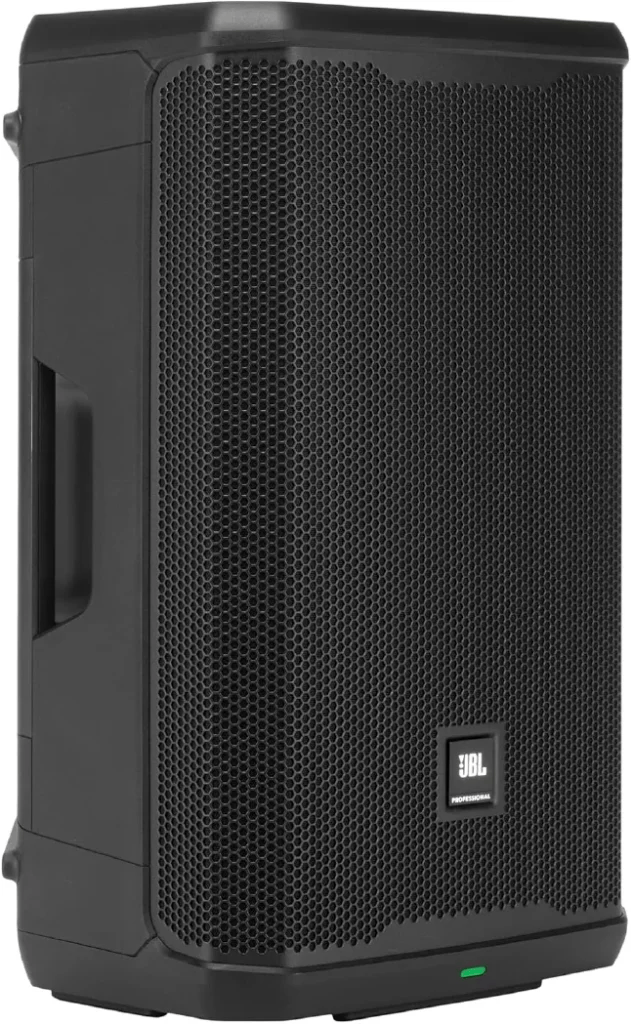
JBL PRX912
Image Source
4. JBL PRX912: Best for Large Indoor and Outdoor Crowds
Price: $899 (single)
Weight: 43 lbs
Driver Size: 12 inches
Output Power: 2000 watts
Connectivity: Input: (2) XLR ¼ combo and (1) 1/8; Output: (2) XLR (thru) and (1) XLR (mix out)
Bluetooth: Yes
JBL PRX912 is lightweight with high-quality power, making it a reliable pick for massive indoor and outdoor events. This speaker also has an onboard color LCD screen for easy mixing access.
Chen praises the JBL: “I have always loved JBL. There are other great brands out there, but the PRX line has been known for being rugged with an all-wooden cabinet. They are super durable and can sound good in any room.”
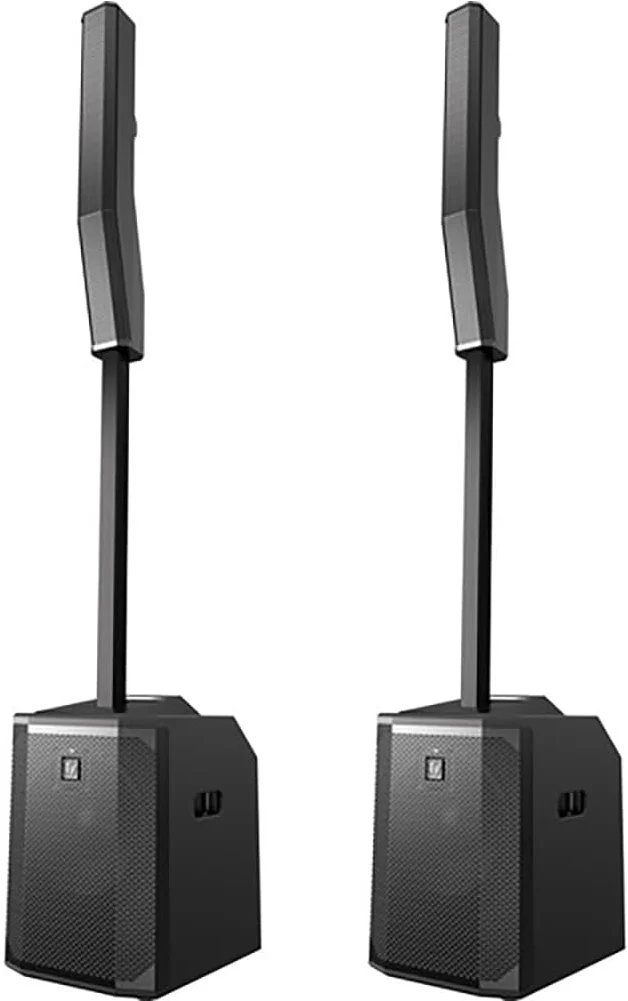
Electro-Voice Evolve 50
Image Source
5. Electro-Voice Evolve 50: Best for High-End Weddings and Events
- Price: $3,399 (pair)
- Weight: 44.66 lbs
- Driver Size: 12 inches
- Output Power: 1000 watts
- Connectivity: Input: (2) XLR/TRS combo jack, (1) 3.5 mm, (1) wireless Bluetooth audio; Output: (1) XLR Thru output, (1) XLR mix out output
- Bluetooth: Yes
While Electro-Voice Evolve 50 may be on the pricier side, Chen says its versatility makes it a worthwhile investment. Featuring powerful sound output in a compact design, these Bluetooth-compatible speakers let you leave a lasting impression on crowds at high-end clubs and wedding spaces.
According to DJ Druw, the column design is also “great because it’s a subwoofer with a top speaker on a pole. But the top speaker is slim, thus taking up less footprint when packing it inside my car.”
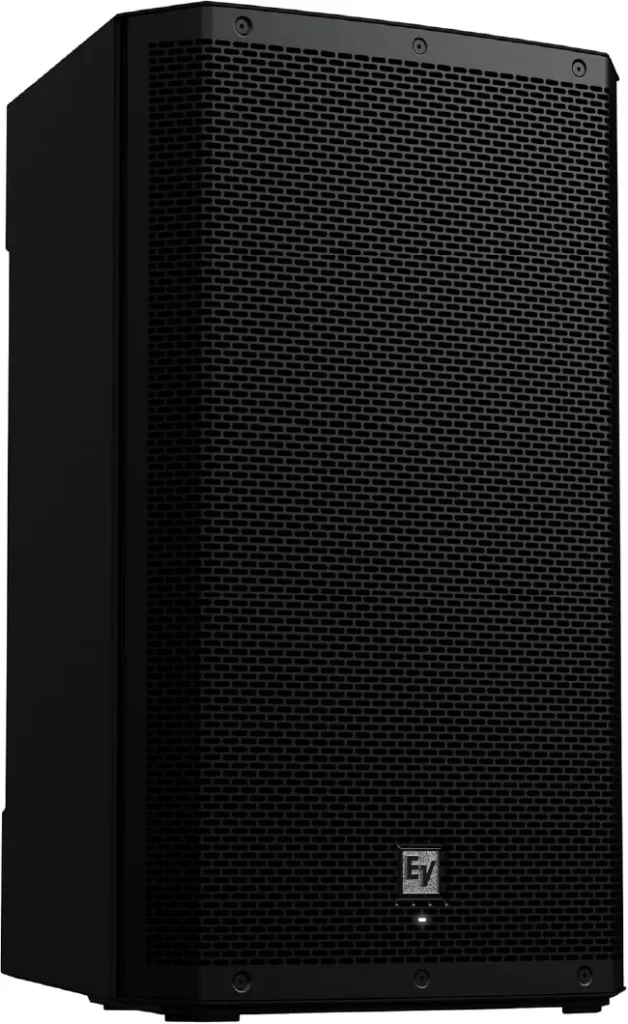
Electro-Voice ZLX 15P
Image Source
6. Electro-Voice ZLX 15P: Best for Medium or Large Parties
- Price: $699 (single)
- Weight: 37 lbs
- Driver Size: 15 inches
- Output Power: 1000 watts
- Connectivity: Input: (2) XLR/TRS combo and (1) ¼” TS; Output: (1) XLR output
- Bluetooth: Yes
The Electro-Voice ZLX 15P speaker set has a 4-channel mixer with XLR and TRS inputs. Thanks to the Electro-Voice QuickSmart Mobile app for smartphones and tablets, you can control performance statuses and speaker functionality with the swipe of a finger. The 15-inch woofer also pumps out strong sound for all your gigs.
This model is perfect for corporate events, live band performances, and other mid-sized and large events.
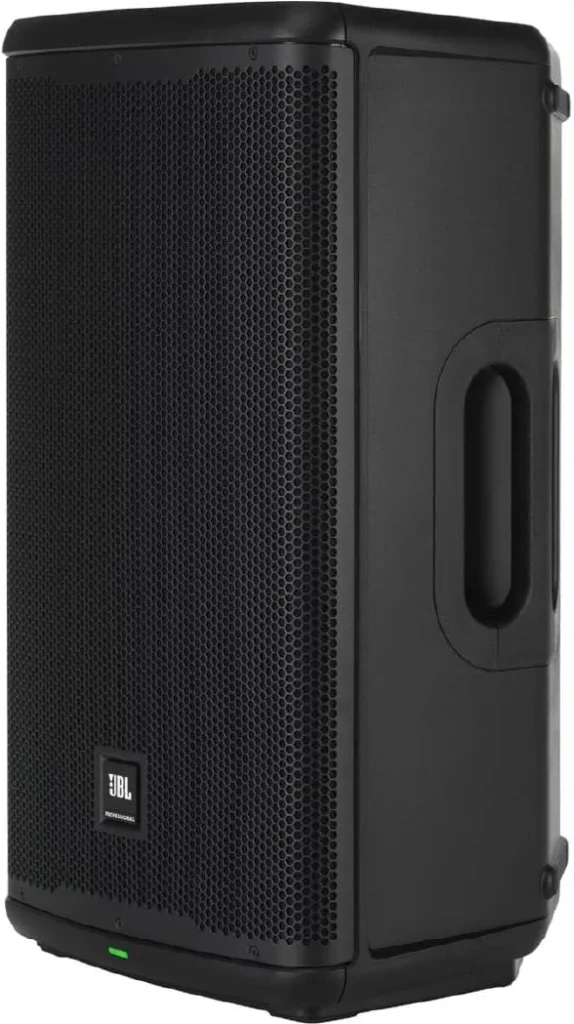
JBL EON712
Image Source
7. JBL EON712: Best for Moderately-Sized Events and High Portability
Price: $499 (single)
Weight: 32 lbs
Driver Size: 12 inches
Output Power: 1300 watts
Connectivity: Input: (2) XLR 1/4 combo; Output: (1) XLR (thru)
Bluetooth: Yes
Thanks to built-in 5.0 Bluetooth audio streaming, the JBL EON712 has improved audio fidelity, a broader range, and decreased latency. This speaker’s waveguide technology offers smooth, transparent sound to all audience members for better reach and engagement.
Thanks to the Bluetooth feature and 1300-watt output, this speaker offers flexibility and sound control across medium-sized events and crowds, including weddings, fairs, and corporate parties.
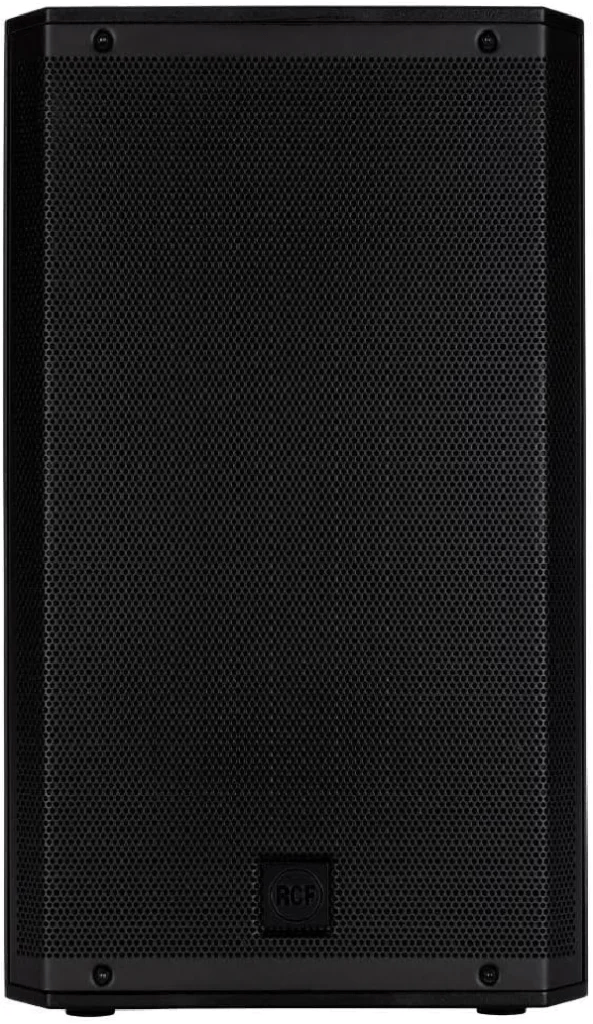
RCF ART 912-A
Image Source
8. RCF ART 912-A: Best for Large Events and Festivals
- Price: $899 (single)
- Weight: 41.8 lbs
- Driver Size: 12 inches
- Output Power: 2100 watts
- Connectivity: Input: (1) XLR 1/4 combo; Output: (1) XLR
- Bluetooth: No
The RCF ART 912-A delivers stellar audio and powerful output, making it a smart choice for large clubs, beach parties, and other events with large audiences. The M-brace design provides a sturdy structure that can stand up to travel and rowdy crowds.
Don’t Forget to Insure Your Equipment (and Your Business)!
Once you find the best speakers for a DJ, you need to protect your investment (and the rest of your gear) with DJ equipment insurance. Why? Sometimes accidents happen, and you could get hit with some costly claims that would financially cripple your business without the right coverage.
Gear and equipment make up 90% of our policyholders’ claims. These are just a few of the losses we’ve covered:
- While performing at a gig, someone broke into a DJ’s car and drove off with their gear in the trunk — $1,888
- An attendee bumped into a DJ’s booth, which knocked over and broke a mixer at a club — $599
- A partygoer knocked a DJ’s loudspeaker into the ocean at a beach party — $434
Without your gear, you can’t do what you do. DJ insurance with equipment coverage ensures that you can pay to repair or replace your speakers, mixers, and other essential gear without missing a beat.
Note: Gear and Equipment Coverage is only available under the annual policy.
FAQs About DJ Speakers Insurance
Can Liability Insurance Cover DJ Equipment Damage or Theft?
Liability insurance alone does not cover your DJ equipment from damage or theft. However, as an optional add-on, you can include Gear and Equipment Coverage in your annual DJ insurance policy.
Is DJ Speaker Insurance Available for One-Off Events or Only Annual Coverage?
DJ speaker insurance is only available as an add-on coverage option under an annual policy.

Khaleel Hayes | Copywriter
Licensed insurance agent in the state of Colorado and fully trained in Insurance Canopy coverage, copywriter Khaleel Hayes writes about DJ and Entertainer policies and products. He holds a B.A. in Journalism from Metropolitan State University of Denver. Before working at Veracity, Hayes worked as an Amazon warehouse worker, a B2B writer for software consultancy SelectHub, and a freelancer for numerous publications in the Mile High City.
Licensed insurance agent in the state of Colorado and fully trained in Insurance Canopy coverage, copywriter Khaleel Hayes writes about DJ and Entertainer policies and products. He holds a B.A. in Journalism from Metropolitan State University of Denver. Before working at Veracity, Hayes worked as an Amazon warehouse worker, a B2B writer for software consultancy SelectHub, and a freelancer for numerous publications in the Mile High City.





